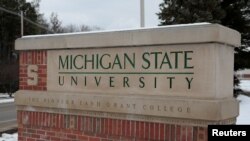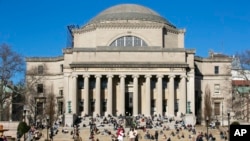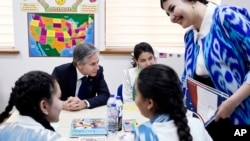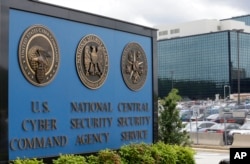Student Union
- By Paul Ross
NSA Invites Students to 'Hack Us!'

Ever think about hacking into the U.S. government’s data system? Wanna try?
If you can develop a network signature for an intrusion detection system (detect hacking), or perform forensic analysis of a compromised endpoint (detect hacking before it collapses the system), the National Security Administration wants you to try.
Registration is open for the 2017 Codebreaker Challenge. The contest asks college students to use reverse engineering or the ability to take apart code and fix from scratch a fictional break-in of a government data system. The scenario helps the Department of Homeland Security disarm an improvised explosive device using cybersecurity skills to prevent civilian casualties.
“Reverse engineering is a crucial skill for those involved in the fight against malware, advanced persistent threats, and similar malicious cyber activities,” the NSA website says. “As the organization tasked with protecting U.S. government national security information systems, NSA is looking to develop these skills in university students (and prospective future employees).”
Each year, undergraduate and grad students who compete to master six tasks will receive a small token of appreciation from the NSA for being among the first 50 finishers, and possible credit from the student’s college or university.
- Setup a test instance of the system (Task 0)
- Analyze suspicious network traffic (Task 1)
- Develop a network signature for an intrusion detection system (Task 2)
- Analyze critical system components for vulnerabilities (Tasks 3 and 4)
- Perform forensic analysis of a compromised endpoint (Task 5)
- Craft an exploit for the botnet server and devise a strategy to clean the infected endpoints (Task 6)
Registration for students with a valid email address ending in .edu started September 15 and continues until December 31.
This year, some have gotten close, but no one has completed all six tasks, so far, says the Codebreaker Challenge website. As of September 25, students from 335 colleges and universities have tried.
The most participants in 2016 came from Georgia Institute of Technology in Atlanta, with 149 students taking the challenge, but only five completing all six tasks, which also ranks first for most successful participants.
In addition to Georgia Tech, three students from Carnegie Mellon University in Pittsburgh, completed every task; as well as three from the U.S. Naval Academy in Annapolis, Md. one from University of Maryland, College Park, one from Naval Postgraduate School in Monterey, Calif., one from Lesley University in Cambridge, Mass., and one from Williams College in Williamstown, Mass.
Last year, 3,325 students from 481 colleges and universities attempted to finish all six tasks; only 15 students were successful. Robert Xiao from Carnegie Mellon University in Pittsburgh completed every task in just under 18 hours, which was nearly two and a half days quicker than the next fastest finisher.
“I find computer security to be a fascinating subject, and I was really lucky to be accepted at Carnegie Mellon, which has an excellent computer security reputation,” said Xiao, who was born and raised in Canada.
Carnegie Mellon ranks in the top 20 for cybersecurity schools in the U.S. and is known nationwide as a pipeline for future computer security experts. Xiao is on the Plaid Parliament of Pwning (PPP) hacking team at CMU and says the team, “participates in worldwide computer security competitions and does very well.”
That’s not an understatement. In fact, the PPP hacking team has won eight straight virtual capture-the-flag competitions at New York University’s Cyber Security Awareness Week and won the World Series of Hacking college competition four of the past five years.
The 2017 Codebreaker Challenge “is very challenging and covers a wide range of subjects ... but it takes a lot of time and effort at first,” Xiao says. “Don’t get discouraged if it seems too hard, that’s totally normal at first.”
Xiao is doing a Ph.D. in what he calls “human-computer interaction,” in which he wants to merge computer security and human interaction.
“The subject of ‘usable’ human-friendly security is really important and only a handful of people are thinking really hard about it,” he said. Essentially, Xiao wants to expand the use of computer security for those who might not be the most adept at using computers; in other words, make computer security easier for the everyday user.
Instructions and storyline for this year's challenge can be found on the Codebreaker Challenge website.
Can you crack the code?
What do you think about the National Security Administration's invitation? Please share your suggestion in the Comments here, and visit us on Facebook, Twitter, Instagram and LinkedIn, thanks!
See all News Updates of the Day
- By VOA News
Michigan State international students get their own space

Michigan State University in East Lansing, Michigan, is setting aside a space in the International Center for international students.
Nidal Dajani, vice president of the school's International Student Association, said that the club plans to use the space to host events and hopes to collaborate with other student groups.
- By Dylan Ebs
International students find community during Pride Month

For LGBTQ+ international students, Pride Month, observed in June, is a unique time to reflect.
They hold on to multiple identities — both their LGBTQ+ identity and their cultural background — but coming to terms with them is not always easy.
For graduate student David Zhou, these identities can feel conflicting as transgender rights in China remain a controversial issue and spaces for LGBTQ people close. Zhou, 25, is transgender and pursuing an education in the STEM field at an urban university in the Midwestern United States.
VOA is using a pseudonym for Zhou’s first name and is not naming his university to protect his identity due to safety concerns back home in China. Zhou is not open about his transgender identity to his family.
During Pride Month, Zhou said he attended multiple LGBTQ+ events in his community and is surrounded by a supportive group of LGBTQ+ students who can relate to his experiences. But he’s not open about his identity to everyone on campus and said he doesn’t disclose his preferred pronouns to everyone to avoid transphobic comments.
“I feel like I have to make some judgments of the character of that person to see if they’re a good person to disclose [my identity] to,” Zhou said.
Zhou’s Pride Month celebrations included attending local markets with LGBTQ+ vendors and hanging out with his LGBTQ+ friends.
“They normalized being trans and for a long time I feel like trans identity is, should I say a vulnerability, brings me fear and worrying about discrimination, but having those events are helpful because it allowed me to see that queer people could just [live] openly,” he said.
At social events where few international students are present, Zhou said it can be tough to fit in.
“There's a lot of times like when they were talking about things I kind of, don't really understand, mostly because I kind of lack some background experience or knowledge,” he said.
Zhou said he is not aware of specific groups for LGBTQ+ international students at his university, but said international students are more prevalent in graduate programs and therefore find representation in organizations for LGBTQ+ graduate students.
In China, transgender individuals must obtain consent from an “immediate family member,” even for adults hoping to transition, which critics say limits the autonomy of transgender individuals while supporters say the policy protects doctors from violence by upset parents.
Struby Struble, a former coordinator of the University of Missouri LGBTQ+ Resource Center, told NAFSA: Association of International Educators in 2015 that LGBTQ+ international students face a “double barrier” on campus.
“With their international student friends, they feel isolated because they’re the LGBT one,” she said. “But then among the LGBT students on campus, they feel isolated because they’re the international one.”
Nick Martin, associate director of the Q Center, Binghamton University’s LGBTQ+ student support office, said when international students tour the center, there’s often a sense of hesitation as they enter a type of space that may not be present in their home country.
“I compare that to a year in after they've come into the space, they've again, maybe come to some of our events, they've got more connected,” he said.
Martin said graduate students have a unique interest in the Q Center as they may use the office for research and advocacy purposes that align with their studies.
“For older students, there may be hesitancy in a different way, but I think it's more in the vein of they want to do some of the advocacy work,” he said.
Martin said he thinks about how both his office and BU’s international student office can support students who come from countries with few — if any — protections for LGBTQ+ individuals.
“It's been a learning process of what those students really need, but I think I've kind of learned that a lot of students are just looking for the safe space that we offer,” Martin said.
- By VOA News
International students discuss US campus culture shock

International students at De Anza College in Cupertino, California, talked about culture shock in an article in La Voz News, the student newspaper.
"It felt like a major culture shock. Everything was so different, from academics to mannerism," said a student from Mexico.
Read the full story here.
These are the most expensive schools in the US

High tuition costs along with housing and food expenses can add up for students at U.S. colleges and universities.
MSNBC looked at the most expensive schools in the country, with one costing more than $500,000 for a bachelor’s degree. (June 2024)
Uzbekistan students admitted into top US universities

Students from Uzbekistan are among the international students admitted to top colleges and universities in recent years.
Gazata.uz profiled some of the Uzbekistan students attending Harvard, Brown, Princeton and other U.S. universities. (June 2024)







